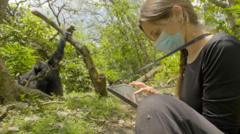Chimpanzees in the Budongo Forest of Uganda have been filmed employing various medicinal plants to treat wounds and injuries, a finding reported by scientists from the University of Oxford alongside local researchers. This new evidence of "forest first aid" builds upon previous discoveries indicating that chimpanzees seek out specific plants for self-medication.
The collaborative research team documented numerous instances where chimpanzees utilized plant materials, either on their own bodies or on others, suggesting a higher cognitive ability among these primates. The study, published in the journal Frontiers in Ecology and Evolution, reveals a range of behaviors chimpanzees exhibit when addressing injuries, emphasizing their understanding of hygiene and health maintenance.
Lead researcher Elodie Freymann noted the complexity of these behaviors, highlighting examples where chimpanzees chewed plant materials before applying them to their wounds. In notable footage, a young female chimpanzee was seen treating an injury on her mother, while other observations indicated chimps caring for unrelated individuals. This capacity for empathy, previously associated with humans, positions chimpanzees in a unique light concerning their emotional and social behaviors.
The study draws from a long history of observations dating back to the 1990s, recorded in logs maintained at the research site. Many anecdotes described chimpanzees engaging in plant-based wound treatments and employing herbal remedies, revealing similarities to human hygiene practices, such as using leaves for cleansing after fecal elimination.
In addition to behavioral studies, the team analyzed the plants identified as medicinal, discovering that several possess antimicrobial properties. This aligns with findings from other researchers who noted similarities in the medicinal use of plants by other primate species, such as orangutans.
Freymann emphasized the deeper understanding that can be gleaned from studying the natural practices of these creatures. The discoveries not only shed light on chimpanzee intelligence and capabilities but also offer insights into potential new medicinal developments inspired by these natural healing methods.
Reflecting on the harsh realities of the wild, Freymann remarked on the exceptional survival skills exhibited by chimpanzees, who adeptly navigate their environment to seek out healing resources essential for their existence. This research continues to unveil the astonishing intelligence and adaptive strategies of our closest primate relatives.



















